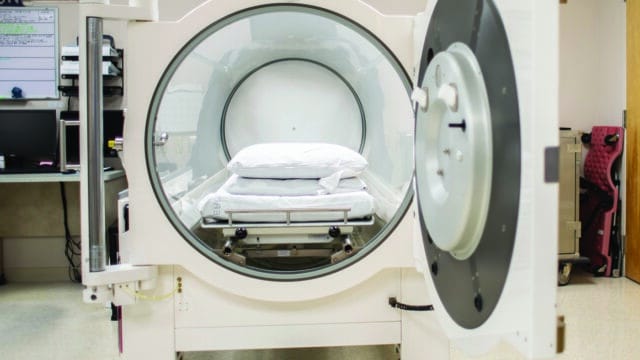How Oxygen Therapy Can Enhance Your Health and Well-Being

Oxygen is vital for life. It is the fuel that powers our cells, supports every bodily function, and ensures our survival. Without oxygen, our organs and tissues cannot function efficiently. When oxygen levels drop below normal, it can lead to a wide range of health problems. For many people with chronic illnesses, oxygen therapy offers a solution that can significantly improve their health and well-being. This article explores how oxygen therapy works, the benefits it offers, and how it can enhance your overall quality of life.
What is Oxygen Therapy?
Oxygen therapy involves the use of supplemental oxygen to treat conditions that cause low blood oxygen levels (hypoxemia). This therapy is often prescribed for individuals whose lungs are not functioning optimally, making it harder for them to absorb sufficient oxygen from the air. Oxygen therapy increases the amount of oxygen delivered to the body, improving oxygen levels in the blood and supporting normal organ function.
There are several ways in which oxygen therapy can be delivered, depending on the patient’s needs. The most common methods include:
- Nasal Cannula: A lightweight tube that delivers oxygen through the nose.
- Face Mask: A mask that covers the nose and mouth, delivering oxygen at a higher flow rate than a nasal cannula.
- Oxygen Concentrators: Devices that filter and concentrate oxygen from the surrounding air.
- Portable Oxygen Cylinders: Tanks that store oxygen in a compressed form for mobility.
Whether used for short-term relief or as a long-term treatment, oxygen therapy helps boost oxygen levels, enabling the body to perform at its best.
The Mechanism Behind Oxygen Therapy
The body requires oxygen to maintain cellular function, support metabolism, and produce energy. Normally, oxygen is absorbed into the lungs when you inhale, diffuses into the bloodstream, and is transported to tissues and organs through red blood cells. However, in certain medical conditions such as chronic obstructive pulmonary disease (COPD), asthma, or pneumonia, the lungs are unable to effectively absorb enough oxygen, leading to decreased blood oxygen levels.
Oxygen therapy provides a supplemental source of oxygen that helps compensate for the body’s inability to obtain enough oxygen naturally. By increasing the amount of oxygen in the bloodstream, it ensures that the body’s tissues and organs receive the oxygen they need to function optimally.
How Oxygen Therapy Enhances Health
Oxygen therapy offers a wide range of benefits for individuals with respiratory issues and other conditions that affect oxygen levels. Here are some of the ways in which it enhances health and well-being:
1. Improved Respiratory Function
For individuals with chronic respiratory diseases such as COPD, emphysema, or pulmonary fibrosis, breathing can become difficult due to the inability of the lungs to absorb sufficient oxygen. Oxygen therapy ensures that these individuals have enough oxygen to breathe comfortably, reducing shortness of breath and improving overall respiratory function. By supplying the body with adequate oxygen, patients can engage in physical activities and experience a better quality of life.
2. Increased Energy and Reduced Fatigue
One of the most immediate effects of oxygen therapy is a noticeable increase in energy levels. Chronic low oxygen levels can lead to fatigue, weakness, and an overall lack of energy. When the body’s tissues receive the oxygen they need, they can perform metabolic processes more efficiently, leading to improved energy levels. This boost in energy helps people with chronic illnesses engage more fully in daily tasks, enjoy physical activities, and experience greater vitality.
3. Enhanced Cognitive Function
The brain is highly sensitive to changes in oxygen levels. When oxygen levels drop, it can lead to symptoms such as confusion, difficulty concentrating, and memory problems. For individuals with conditions like sleep apnea, stroke recovery, or heart failure, oxygen therapy can help restore normal oxygen levels to the brain, improving cognitive function and mental clarity. Enhanced oxygen supply allows the brain to function more effectively, supporting focus, memory, and overall mental performance.
4. Support for Organ Function
All of the body’s organs rely on oxygen to function properly, and prolonged oxygen deficiency can lead to organ damage or failure. The heart, kidneys, and liver are particularly sensitive to changes in oxygen levels. Oxygen therapy ensures that these organs receive the oxygen they need to work efficiently, supporting overall organ health. For individuals with heart failure or kidney disease, oxygen therapy can reduce the risk of complications by preventing organ damage caused by hypoxia (low oxygen levels).
5. Improved Sleep Quality
Sleep apnea is a common condition where the airway becomes blocked during sleep, causing breathing interruptions and drops in oxygen levels. This leads to restless sleep, snoring, and fatigue during the day. Oxygen therapy can help treat sleep apnea by maintaining oxygen levels during sleep, leading to better quality rest. By supporting regular breathing and reducing oxygen deprivation, oxygen therapy helps individuals with sleep apnea feel more rested and refreshed.
6. Faster Recovery from Illness or Surgery
Oxygen therapy is an essential part of recovery for individuals recovering from surgery, injury, or serious illness. Whether recovering from a stroke, surgery, or infection, oxygen plays a key role in the healing process. It enhances the body’s ability to repair tissues, reduce inflammation, and fight infections. For individuals with slow-healing wounds or chronic infections, oxygen therapy can promote faster healing by increasing oxygen supply to the affected areas.
7. Alleviation of Symptoms in High-Altitude Environments
High-altitude environments, especially those above 8,000 feet, have lower oxygen levels, which can cause symptoms of altitude sickness, including dizziness, nausea, shortness of breath, and fatigue. Oxygen therapy can help individuals acclimate to high altitudes by providing supplemental oxygen, alleviating symptoms, and allowing them to breathe more easily. Athletes and mountaineers use supplemental oxygen to prevent altitude sickness and enhance their physical performance at high altitudes.
Applications of Oxygen Therapy
Oxygen therapy is not just limited to those with chronic respiratory diseases. It has a wide range of applications for various health conditions. Some of the most common medical conditions for which oxygen therapy is used include:
- Chronic Obstructive Pulmonary Disease (COPD)
- Asthma
- Pneumonia
- Congestive Heart Failure
- Sleep Apnea
- Stroke Recovery
- Carbon Monoxide Poisoning
- High-Altitude Sickness
- Wound Healing and Post-Surgical Recovery
- Hyperbaric Oxygen Therapy (HBOT) for certain infections and wounds.
Considerations and Risks
While oxygen therapy is generally safe, there are some risks and precautions to consider. For example, prolonged exposure to high oxygen concentrations can lead to oxygen toxicity, which can cause lung damage or central nervous system issues. It’s essential that oxygen therapy is administered under the guidance of a healthcare provider, with regular monitoring of oxygen levels to ensure safety.
Additionally, the method of delivery (nasal cannula, face mask, etc.) should be adjusted to meet the individual’s needs, and the device should be used correctly to avoid complications such as skin irritation or infection.
Conclusion
Oxygen therapy is an effective and life-enhancing treatment that can significantly improve health and well-being for individuals with various medical conditions. By improving oxygen levels in the bloodstream, it supports better respiratory function, enhances energy levels, boosts cognitive performance, and aids in faster recovery. Whether used to manage chronic diseases or to aid in recovery from illness or surgery, oxygen therapy plays a crucial role in maintaining overall health. If you or a loved one is prescribed oxygen therapy, understanding its benefits and following your healthcare provider’s instructions will help maximize the positive impact on your li




